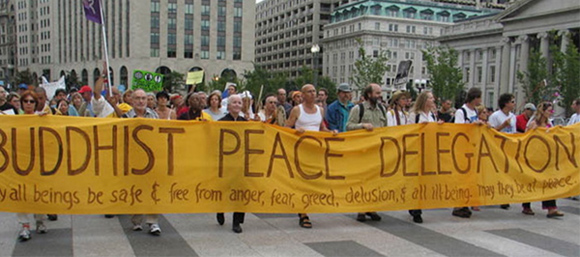
Buddhism in the West continues to see the rise of new figures and movements, though not all are acknowledging their Buddhist roots, according to a roundtable discussion of scholars and practitioners in the Fall issue of French magazine Ultreïa!. Some of these assessments differed between France and America. Philipe Cornu, an academic and a teacher of Buddhism, notes how successful mindfulness has become in various circles while often rejecting its Buddhist roots. While some might see this popularity as a proof of Buddhism’s success in the West, Cornu is not so sure. Appropriating elements of Buddhism while ignoring that they are part of a wider spiritual path shows how many often do not take Buddhism as a whole but rather reduce it to small pieces, such as techniques for well-being and advice for daily life. The potential for narcissism in this approach is a far echo from the Buddhist message as a path to liberation from conditioned existence, associated with compassion and altruism, Cornu adds. The original medical applications of mindfulness in the late 1970s were a way of using Buddhist techniques to help patients, while more recent uses rather tend to stress efficiency in one’s professional life. Benefits are obvious, but a pinch of spirituality in daily life cannot be equated with a spiritual path. Such uses of Buddhism in the West make it difficult at this point to foresee what its future could be, Cornu concludes.
A teacher of Zen, Eric Rommeluère, is aware that Zen Buddhism has mutated through its history and has been influenced by different environments and historical events. The propagation of Zen Buddhism in the West is largely the consequence of a decision by monks to relieve themselves of their priestly duties in Japanese society and diaspora for the sake of teaching international audiences. Initially, Zen attracted people who had been influenced by the views of the counterculture. These days, Rommeluère adds, this association is no longer the case, to the extent that Zen Buddhism has sometimes become diluted into mainstream culture. As with other Buddhist schools, the success of mindfulness techniques presents a challenge. Fewer people are willing to commit themselves for retreats lasting for several months, and seminars of a short duration are preferred. In France, at least, Rommeluère is not so sure about the future of Buddhism—especially Zen— as the competition from mindfulness challenges it.
The recent loss of the magazine Books & Culture and of the Institute for the Study of American Evangelicals (ISAE) due to lack of funding has been a setback for evangelical intellectuals and scholars, but they are spreading their influence outside of their own institutional channels, writes John Schmalzbauer in Comment magazine (January 12). Evangelicals […]
The revival of Southern gospel singing schools is rivaling the Sacred Harp singing schools that have flourished among more secular Americans, writes Brooks Blevins in the journal Southern Cultures (Winter). Both kinds of singing schools train laypeople to sing hymns and other traditional sacred music based on shape notes, which replace standard round notes with […]
Users of mobile apps for practicing the Catholic ritual of confession find the experience authentic and affirmative of their faith, although they are in many cases replacing the authority of the priest with “algorithmic automation,” according to a study in the Heidelberg Journal of Religions on the Internet (11). The study, conducted by Sasha A. […]
Even as American politics is embroiled over what has been called the “Muslim ban” in immigration, Americans have increasingly become more accepting of Muslim people, according to surveys from the Brookings Institution and Public Religion Research Center. Surveys conducted during the election year “reveal extraordinary, progressive and unexpected shifts that cannot be explained by events […]
A bitter split within the conservative Brazilian (and international) Tradition, Family and Property (TFP) organization shows a move toward stricter forms of contemporary Catholicism, but also how different organizations cater to different niches in Brazil’s religious market, writes Massimo Introvigne (Center for Studies on New Religions, CESNUR) in a special issue of the Alternative Spirituality […]
The flood of refugees from the Middle East into Europe is raising concern about the mental health and adjustment of these newcomers, leading to the growth of Islamic healing and even exorcism practices and groups, reports America magazine (January 2). There has been a reported rise in mental health issues among the approximately 10 million […]
A more public form of Catholicism has arrived in France that may seem unexpected in this secular country but has actually been developing for decades, writes Samuel Gregg in First Things magazine (February). The emergence of popular presidential candidate Francois Fillon, a devout Catholic with conservative views on abortion and euthanasia, has galvanized young and […]
Since Russia annexed the Crimean Peninsula, much of the region today reflects Russian religious dynamics, including increased restrictions on minority religions, according to the East-West Church & Ministry Report (Winter). Roman Lunkin writes that since Crimea became subject to Russia, the “new order” has consisted of “copying Russian federal support for Orthodox churches of the […]
A strong Pentecostal movement has been growing among the Roma people for more than a decade, but the suspicion still follows the group that they are pursuing this faith for economic gain. A recent study suggests otherwise. The Roma people are believed to have pursued what is called “extrinsic religion” throughout their still mysterious history—adapting […]